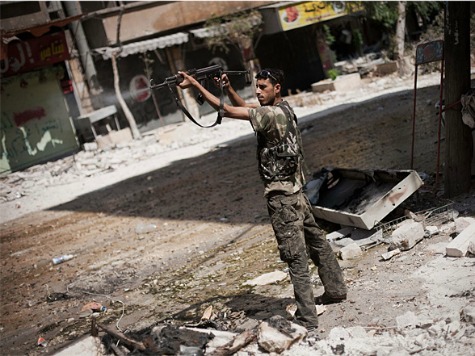
This morning’s key headlines from GenerationalDynamics.com
- Debka: U.S., Israel, Turkey, Jordan planning military action in Syria
- Islamic Movement of Uzbekistan (IMU) tries to regain influence
- Bank of Cyprus customers will lose 60% of their savings
Debka: U.S., Israel, Turkey, Jordan planning military action in Syria
I try to be cautious about quoting Debka, whose reporters havecontacts within intelligence services in a number of countries. Onthe one hand, they provide insights that are not available elsewhere.But on the other hand, they sometimes get things wrong. In the pastfew years, they’ve predicted several imminent wars that neveroccurred. Debka’s weekly subscriber-only newsletter (sent to me by asubscriber) is laying out plans for imminent military action in Syria,to counter the threat of chemical and biological weapons, either bythe regime of president Bashar al-Assad, or by al-Qaeda linkedterrorists, such as the jihadist group Jabhat al-Nusra Brigades. Thefollowing is a summary of what Debka is saying. I leave it to you,Dear Reader, to do your own evaluation as to how close we are tofull-scale war in Syria:
- The recent restoration of diplomatic relations between Turkey and Israel has opened the door to a joint military operation by the U.S., Turkey, Israel and Jordan in Syria. For the U.S., this would not be a “lead from behind” operation. The U.S. would supply 12,000 soldiers initially, increasing to 75,000.
- The objective of this operation would be to take control of Syria’s chemical and biological weapons, keeping them out of the hands of either the al-Assad regime or the al-Qaeda linked terrorists. However, a second operation, involving NATO, would have removal of al-Assad its objective. A possible Israeli objective would be to attack Hizbollah in Lebanon.
- In anticipation of this military operation, Russia and Iran have been doubling or tripling their arms shipments to the al-Assad regime. Furthermore, the flights have been landing in air strips closer to the actual battles, to avoid having to transport the weapons over land. On Thursday, the regime issued protective gear for chemical warfare to two elite Syrian army divisions. Al-Assad may be planning an all-out attempt to win the civil war, through the use of chemical and biological weapons.
- The following “terrorist organizations” are defined: On the one hand, the Lebanese Shiite Hizbollah and the Alawite “Shabiha” – civilian militiamen loyal to the Assad clan and his Ba’ath party, who were recently augmented by Iraqi Shiite fighters; and, on the other, Islamist rebel forces led by Al Qaeda’s Syrian arm, the Jabhat al-Nusra Brigades.
- A major split has occurred in the Arab League, with opposing factions led by Saudi Arabia and Qatar. Saudi Arabia has launched a large-scale supply operation of heavy weapons to rebel forces for the capture to Aleppo airport, to inhibit weapons shipments from Iran and Russia to the al-Assad regime. Ironically, the weapons are Russian-made, having been purchased from the Balkans nations of Serbia, Bosnia, Croatia and Kosovo.
- The news that Saudi Arabia was supplying Syrian rebels with heavy weapons caused verbal and physical violence between Saudi and Qatari delegates at least week’s Arab League summit. The Saudis accuse the Qataris of conspiring to bring the Muslim Brotherhood to power in Damascus, including radical groups tied to al-Qaeda. The Qataris accuse the Saudis of trying to gain control of the Syrian rebel movement.
- Since March 21, Russian warships in the Mediterranean were ordered to avoid Syria’s Tartus port, because the piers and facilities are crowded with Syrian Alawite refugees begging Russian seamen begging for food, water and medical aid. Instead, they’ll be docking at Lebanon’s Beirut port.
Islamic Movement of Uzbekistan (IMU) tries to regain influence
The Islamic Movement of Uzbekistan (IMU) has been trying for years togain worldwide stature as militant jihadists, but actually has beenlosing influence in its home regions in Central Asia. The lost ofinfluence is attributed to an information campaign that has beenconducted in the region, involving governments, religious leaders,media and NGOs, to explain the differences between true religion andextremism. In fact, the IMU is currently more deeply entrenched inPakistan and Afghanistan. But with the spring thaw in progress, it’snow trying to make alliances with other terrorists to reestablishitself around the volatile Fergana Valley, and all along the borderbetween Kyrgyzstan and Uzbekistan. Central Asia Online
Bank of Cyprus customers will lose 60% of their savings
Details continue to come out about how much of the savings of Cyprussavers will be confiscated by the government in return for the EUbailout that prevented bankruptcy. Bank accounts containing less than100,000 euros will remain, although there will remain strict limits onwithdrawals. But savings above 100,000 euros in the Bank of Cypruswill lose 60% or more of their savings:
- The first 37.5% will be converted into near worthless shares of the Bank of Cyprus.
- The next 22.5% will be permanently confiscated.
- The remaining 40% will be temporarily frozen, and will be released
Quite honestly, this takes my breath away. Bloomberg and AFP
Permanent web link to this article
Receive daily World View columns by e-mail

COMMENTS
Please let us know if you're having issues with commenting.